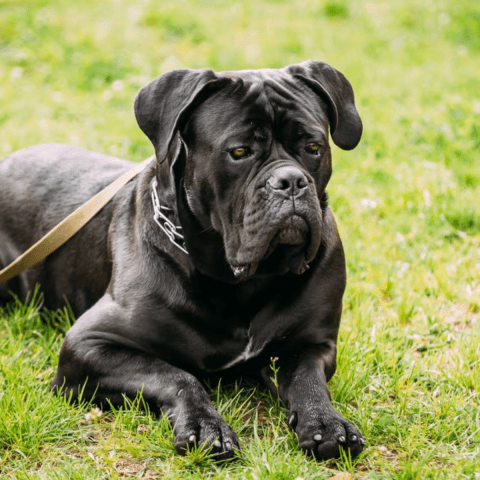As you venture into the world of Cane Corso ownership, you’ll soon realize that beneath their majestic exterior lies a complex web of instincts and emotions. Like a ticking time bomb, aggression can lurk beneath the surface, waiting to be triggered. But fear not, for understanding the intricacies of this ancient breed is key to preventing conflicts and fostering a harmonious relationship. By peeling back the layers of genetic, environmental, and social influences, you’ll uncover the secrets to raising a confident, well-adjusted companion – but are you prepared to face the challenges that lie ahead?
Understanding Cane Corso Aggression

When dealing with a Cane Corso, recognize that aggression in this breed often stems from a complex interplay of genetic, environmental, and social factors that can be traced back to its original purpose as a guardian and working dog. As an owner, you must understand that your dog’s behavior is influenced by its breed history and the dynamics you share with your pet. The Cane Corso’s ancestry as a protector and worker has instilled in it a strong instinct to defend and respond to its environment. This natural inclination can sometimes manifest as aggression if not properly channeled. Your relationship with your Cane Corso plays a vital role in shaping its behavior, and recognizing the impact of your interactions is pivotal. By acknowledging the breed’s historical purpose and your role in your dog’s life, you can begin to address aggression issues more effectively. By doing so, you’ll be better equipped to provide the guidance and support your Cane Corso needs to thrive.
Genetic Factors and Breeding
As you explore the complexities of Cane Corso aggression, you’ll soon realize that genetic factors play a significant role in shaping your dog’s behavior. You’ll want to understand how breeding for temperament can help mitigate aggressive tendencies, and how inherited traits can influence your dog’s behavior. By recognizing the impact of genetics on aggression, you can make informed decisions about breeding and training that will benefit your Cane Corso.
Breeding for Temperament
You can profoundly impact the temperament of your Cane Corso by selecting a reputable breeder who prioritizes breeding for a stable, even-tempered dog. This is vital, as a breeder’s focus on temperament can greatly influence the behavior of their puppies. A responsible breeder will adhere to breed standards, guaranteeing that their dogs exhibit the desired temperament traits.
| Breeding Priorities | Key Considerations |
|---|---|
| Breed Standards | Adherence to breed standards guarantees puppies exhibit desired traits |
| Breeder Accountability | Breeders must be accountable for the temperament of their puppies |
| Genetic Testing | Genetic testing helps identify potential temperament issues
Inherited Traits Matter
As you venture into the world of Cane Corso breeding, recognizing that inherited traits can have a profound impact on a dog’s temperament is vital. One key aspect of breeding Cane Corsos is understanding that inherited traits can profoundly influence a dog’s temperament, making genetic factors a paramount consideration in breeding decisions. You must comprehend that the ancient lineage of this breed has shaped its characteristics, and breed history plays a significant role in determining the traits you’ll see in modern Cane Corsos.
The breed’s history as a guardian and working dog has instilled a strong prey drive and protective instincts, which can sometimes manifest as aggression. A responsible breeder will carefully select breeding stock to minimize the risk of aggressive traits being passed down. By doing so, they can help guarantee that the Cane Corsos they produce are well-suited to life as a family pet or working dog. As you navigate the complex world of Cane Corso breeding, keep in mind that genetic factors are vital in determining the temperament of these magnificent dogs.
Socialization and Environmental Impact
As you work to address aggression in your Cane Corso, recognizing the critical role socialization and environmental factors play in shaping your dog’s behavior is crucial. You’ll want to focus on the early socialization period, ensuring your puppy is exposed to a wide range of positive experiences that will help them develop good social skills. By doing so, you’ll set the stage for a well-adjusted adult dog that’s better equipped to handle the stresses of everyday life.
Early Socialization Period
During the critical early socialization period, between 8 and 11 weeks of age, Cane Corsos are highly receptive to new experiences, and their environment plays a significant role in shaping their temperament and behavior. This period is crucial in laying the social foundation of your Cane Corso. As an owner, it’s essential to understand that your puppy’s early experiences will have a lasting impact on their behavior and temperament.
Here are some key things to keep in mind during this critical period:
- Positive Experiences: Ensure your puppy has positive interactions with people, sights, sounds, and smells to build confidence and reduce anxiety.
- Socialization: Expose your puppy to various environments, people, and situations to help them develop good social skills.
- Handling and Touch: Gentle handling and touch can help your puppy become more calm and trusting.
- Environmental Enrichment: Provide a stimulating environment that encourages exploration and learning.
Puppy Environmental Enrichment

You can profoundly influence your Cane Corso’s temperament and behavior by providing a stimulating environment that encourages exploration and learning during the early socialization period. As a responsible owner, you must create an environment that fosters sensory stimulation and exploration encouragement.
| Environmental Enrichment | Benefits for Your Cane Corso |
|---|---|
| Rotate Toys and Objects | Reduces boredom, stimulates curiosity, and encourages problem-solving |
| Create Obstacle Courses | Improves agility, balance, and coordination, while enhancing mental focus |
| Provide Sensory Experiences | Exposes your Cane Corso to various textures, smells, and sounds, promoting calmness and confidence
Social Exposure Limits
Your Cane Corso’s socialization window, a critical period between 8 and 11 weeks, is limited, making it essential to prioritize exposure to new people, environments, and experiences. During this time, it’s vital to strike a balance between socialization and avoiding overstimulation risks. You want to expand your Cane Corso’s social bubble without overwhelming them.
To achieve this balance, consider the following guidelines:
- Limit social interactions to 10-15 minutes, allowing your puppy to process new experiences without feeling overwhelmed.
- Introduce new environments gradually, starting with small, controlled exposures to new sights, sounds, and smells.
- Monitor your puppy’s body language, recognizing signs of stress or anxiety, such as yawning, panting, or avoidance behaviors.
- Provide regular breaks and quiet time, giving your puppy time to relax and recharge.
Recognizing Early Warning Signs
Cane Corsos often exhibit subtle behavioral cues before escalating into aggressive behavior, and recognizing these early warning signs is essential for preventing conflicts. You can pick up on these cues by paying attention to your Cane Corso’s body language. A tense posture, raised hackles, and direct stares are all indicative of anxiety or stress, which can quickly escalate into aggression if not addressed. You should also be aware of vocal cues, such as growling, snarling, or a high-pitched whine, which can signal that your dog is feeling threatened or scared.
It’s vital to recognize these early warning signs to prevent conflicts and provide a safe environment for both you and your dog. By being attuned to your Cane Corso’s behavior, you can take steps to calm them down and prevent aggression. Remember, recognizing early warning signs is key to de-escalating potentially volatile situations and safeguard a peaceful atmosphere.
Training and Behavior Modification
Training focused on behavior modification is essential to addressing aggression in Cane Corsos, as it helps to redirect their energy and attention away from negative behaviors. By doing so, you can create a more harmonious and peaceful environment for both you and your pet.
To achieve this, you’ll want to focus on positive reinforcement training methods that encourage good behavior and discourage bad behavior. Here are some key strategies to keep in mind:
- Set clear boundaries and rules: Establishing clear expectations helps your Cane Corso understand what is expected of them, reducing the likelihood of aggression.
- Use positive reinforcement training: Reward good behavior with treats, praise, and affection to encourage positive actions.
- Redirect their attention: When you notice aggressive behavior, redirect their attention to a more positive activity, such as a fun game or exercise.
- Consistency is key: Verify that all family members are on the same page and consistently reinforcing good behavior to avoid confusing your pet.
Managing Fear and Anxiety
Managing Fear and Anxiety
Fear and anxiety can escalate aggressive behaviors in Cane Corsos, making it essential to identify and address underlying causes of these emotions to create a more balanced and calm pet. As a responsible owner, you play a vital role in recognizing and managing your Cane Corso’s fear responses and anxiety triggers. Start by observing your dog’s body language and behavior, paying attention to signs of anxiety such as panting, pacing, or avoidance behaviors. Identify potential triggers, such as loud noises, strangers, or specific environments, and develop a plan to gradually expose your dog to these stimuli in a controlled and positive manner.
Prevention Through Proper Care
By providing a stable and nurturing environment, you can substantially reduce the likelihood of aggression in your Cane Corso, as a well-cared-for dog is more likely to feel secure and confident. A vital aspect of prevention is ensuring your dog receives proper care, which encompasses various aspects of their life.
- Nutritious Diet: Feed your Cane Corso a high-quality, balanced diet that meets their nutritional needs, as a well-fed dog is more likely to be calm and content.
- Regular Exercise: Provide your dog with regular, structured exercise to burn off energy and satisfy their instinctual needs.
- Mental Stimulation: Engage your dog’s mind with activities that challenge and engage them, reducing boredom and stress.
- Socialization: Socialize your Cane Corso extensively, exposing them to various environments, people, and situations to help them develop good social skills and confidence.
Frequently Asked Questions
How Can I Introduce My Cane Corso to Other Dogs Safely?
When introducing your Cane Corso to other dogs, start by maintaining a safe Social Distance to prevent immediate reactions. Exude Calm Energy to help your dog feel more at ease, allowing for a smoother interaction.
Can Cane Corsos Be Aggressive Due to Medical Issues?
You need to bear in mind that your Cane Corso’s aggression might be triggered by underlying medical issues, such as pain or discomfort, which can lead to fear responses, making them more defensive or aggressive.
Are Cane Corsos Naturally Protective of Their Families?
You might wonder if Cane Corsos are naturally protective of their families, and research suggests they are! Instinctual loyalty drives them to form strong family bonds, making them loyal guardians of their pack.
Can a First-Time Dog Owner Handle a Cane Corso?
You’re wondering if you, a first-time dog owner, can handle a Cane Corso. Considering their breeding history as guard dogs, you’ll need to manage your expectations, providing consistent training, socialization, and exercise to foster a harmonious relationship.
Do Cane Corsos Require More Exercise Than Other Breeds?
You’re about to discover that Cane Corsos are bred for high-energy activities, requiring daily routines that surpass breed standards – think 2-hour walks and intense playtime – to keep them happy and healthy.
Conclusion
As you navigate the complexities of your Cane Corso’s aggression, remember that prevention is the best medicine. By recognizing the subtle whispers of warning signs, like a ticking time bomb, you can defuse potential conflicts before they escalate. With a well-structured approach, you can help your pet unravel the tangled threads of fear and anxiety, weaving a tapestry of confidence and trust. By taking proactive steps, you’ll be rewarded with a loyal companion that’s a true reflection of your dedication and care.
